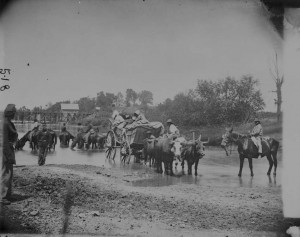by Brooks D. Simpson
For Americans the year 1865 was both end and beginning, transition and transformation. After four years of war the United States successfully subdued a separatist movement called the Confederacy in a bloody conflict that destroyed slavery. A year that began with blueclad armies poised to complete the task of subduing a rebellion ended with the adoption of a constitutional amendment that completed the elimination of the peculiar institution.
In 2015 we will hear and read about how the Civil War concluded, with the capture of the Confederate capital at Richmond followed a week later with Robert E. Lee surrendering his beloved Army of Northern Virginia to Ulysses S. Grant in Wilmer McLean’s parlor at Appomattox Court House. Other people will focus on the last months of Abraham Lincoln’s presidency, from his moving plea for reconciliation and peace in his Second Inaugural to the horror and shock of the assassination five days after Appomattox. Still other people will also observe the process of congressional passage and state ratification of the Thirteenth Amendment, which marked the culmination of the most revolutionary event in American history. This is as it should be, and yet it is not enough.

Americans like to commemorate the end of wars, especially victorious ones, sometimes forgetting that they failed to settle everything. Nowhere was this more evident in determining what the Civil War achieved beyond maintaining national unity through force. Freedom from slavery did not necessarily bring equality; it certainly did not give rise to toleration, let alone acceptance, of diversity. During the next several decades Americans battled each other over what freedom meant for the former slaves. White southerners who did not always support the experiment in southern independence wholeheartedly were far more united in their determination to preserve white supremacy. They engaged in the guerilla war featuring terrorist acts to subdue black aspirations that they declined to wage for Confederate independence. Meanwhile, waning public will in the North and an inadequate federal response to such violence meant that what Lincoln in 1863 called the “unfinished work” before Americans remained incomplete when the experiment called Reconstruction ground to a halt in 1877.
Much has been made of the sesquicentennial of the American Civil War, complete with the appearance of new scholarship, public observances, and the usual assortment of commemorative coins, stamps, and t-shirts that mark such an event. The stories of battles, generals, and soldiers have held center stage most of the time. We have paid less attention to the process whereby agitators and advocates, policymakers and politicians, officers and enlisted men, even desperate Confederate officials, and blacks, both enslaved and free, worked to overthrow slavery. Now we embark on the 150th anniversary of postwar Reconstruction, complete with two more constitutional amendments, a presidential impeachment, a disputed presidential election, and years of struggle resulted in a compromise peace that left much undone. We would do well to note the successes and reflect on the failures of those critical years that defined what war did … and did not … accomplish.
 Brooks D. Simpson is Foundation Professor of History at Arizona State University, where he teaches in the College of Letters and Sciences and Barrett, The Honors College. He has written several books on the Civil War and Reconstruction, including an award-winning biography of Ulysses S. Grant, and most recently coedited the Library of America’s four-volume series on the Civil War. A resident of Gilbert, Simpson has appeared on NPR, PBS, and the History Channel.
Brooks D. Simpson is Foundation Professor of History at Arizona State University, where he teaches in the College of Letters and Sciences and Barrett, The Honors College. He has written several books on the Civil War and Reconstruction, including an award-winning biography of Ulysses S. Grant, and most recently coedited the Library of America’s four-volume series on the Civil War. A resident of Gilbert, Simpson has appeared on NPR, PBS, and the History Channel.
Invite Brooks to speak at your organization! He offers several presentations through the AZ Speaks program. View his presentations in the AZ Speaks Catalog.
